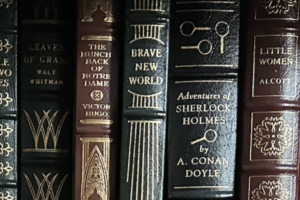As I cruise around book-related groups (primarily via Facebook), I come across near-constant references to “overhyped” books and authors.
The references are typically along these lines:



I could go on and on and on. For what it’s worth, my thoughts on all of the above screen shots:
- Stephen King is a terrific storyteller and writer. Have I liked all of his books? Nope, but I’ve liked many. The Stand is one of my all-time favorite fiction books, and On Writing: A Memoir of the Craft is brilliant. If I could make a personal Top Ten All-time Favorite book list, there would probably be two or three King books in it. (I can’t make said list. I’ve tried. Maybe one day I’ll try again.)
- I tried reading Verity. Lots of people RAVE about this book. I DNF’ed it (Did Not Finish) after 50 pages. Just not my cup of tea. Colleen Hover practically owns the New York Times best seller list. She’s currently got five books in the top ten of the NYT’s paperback trade fiction list. She’s a ridiculously successful author by any definition. She writes mostly romance novels, and that’s about the only genre I don’t read. But that’s me. If you enjoy romance, by all means knock yourself out. No one can tell you, or judge you, for what types of books you like. That’d be beyond silly.
- I’m a raving McFan. I’ve read all twenty of Freida’s (we’re on a first-name basis) books and will read The Coworker when it comes out onAugust 29 — earlier if NetGalley ever approves my request for an ARC (pretty please? UPDATE! ARC approved! Review coming soon.) She owns the Amazon Kindle best seller list with three in the top ten.
Anyway, back to overhyped…
The use of that word drives me bonkers.
I just don’t get it.
How does a book or author become overhyped?
Apparently if “a lot” of people enjoy a particular book, and express that enjoyment via online reviews or comments in the social media space, then the book/author becomes “overhyped.”
I don’t know what constitutes “a lot.”
The Stand has 48,516 ratings on Amazon (4.6 stars) and 730,018 (4.3 stars) on Goodreads.
Verity has 295,423 ratings (4.6 stars) on Amazon and 2,071,332 (4.3 stars) ratings on Goodreads.
The Housemaid, Freida McFadden’s most popular book, has 164,658 (4.5 stars) ratings on Amazon and 436,231 ratings (4.4 stars) on Goodreads.
These are no-doubt very popular books, liked by many, dare I say “a lot” of readers.
And in that sentence is a key word in this discussion–popular.
“Popular” seems to be what makes an author or book “overhyped.”
Overhyped however, has a negative connotation, whereas popular does not.
People whine, almost constantly, in reader groups about overhyped books and authors.
“Why is this book so overhyped? It SUCKED.”
“I don’t understand all the hype around <<insert author name>>. They can’t write their way out of a wet paper sack.” or, “They write on a third-grade level.”
Well thank you, Mr/Mrs Wannbe Be Book Critic, for insulting my choice of recreational reading. Thanks for stooping to immature personal attacks against an author that I’d lay odds you’ve never met in person, nor know anything about them other than they write popular books.
Yes, authors have haters. Welcome to the internet.
Where the “hype” comes from
The overhypeness (I just made up that word) aka popularity of a book or author comes from people that enjoyed said book or author. Books and authors become popular (hence “overhyped”) because many people have found enjoyment in them. Why is that such a bad thing?
Some of these folks act like King, Hoover, McFadden, Grisham, Steel, Rowling, and let’s not forget long-dead authors like Hemingway, Steinbeck, Christie, and Shakespeare run down to their basement and crank up the hype machine. They turn the handle, flip the switch, and auto-magically spew out reviews and social media commentary.
That’s absurd, of course, but seems to be the general train of thought.
Sure, some popular authors have big publishing houses behind them that do market and advertise their books. But MANY authors (Freida McFadden is a perfect example) are almost entirely self-published. Their “marketing team” consists of them and their laptop. Maybe they get help from a company running Facebook ads.
No author, backed by a mainstream publisher or not, becomes overhyped popular from advertising. They become popular because they write well and their books appeal to a wide audience. And a portion of that audience takes the time to write a review, make a social media comment, or tell a friend about this great book they just read.
Likewise, there has never been a book in the history of ever that is universally loved. Why not? Because readers are human beings and as such they have a wide variety of tastes in all things, including books.
I’ve seen people that bought a book they wound up not liking get downright angry and nasty because they can’t wrap their heads around why they didn’t enjoy an “overhyped” book. Many refuse to even consider reading a book, or anything written by a particular author, because they are “so overhyped!”
That baffles my mind.
Equally, perhaps even more, baffling are comments like this:
Well I don’t understand when I read an excellent review in and excellent well known publication…and have been let down!!!…not once but many many times ….this goes usually for famed authors who should NEVER get a ‘negative’ review…
From a Facebook reader group
I mean you do you, and if you want to close your mind to an author’s entire body of work because a lot of people enjoy their writing, then who am I to tell you what to read?
But to get angry and all bothered because you don’t like a overhyped popular book or author, to make a ridiculous statement that no famed author should get a negative review, just makes no sense. If you don’t like a book, the solution seems staggeringly simple — stop reading it. There’s no need to blame the hundreds/thousands/tens of thousands of people that liked the book, there’s certainly no need to blame the author who put their blood, sweat, tears, and time into writing the book.
So you don’t like a book. Big deal. Everyone has books they don’t like. Because every reader is human.


